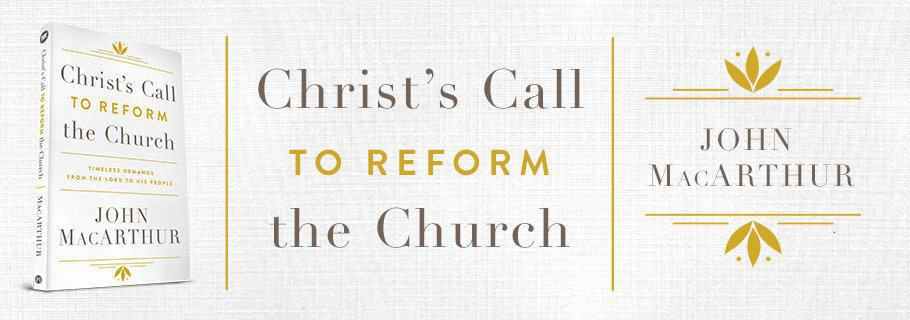This week the blog is sponsored by Moody Publishers who are promoting John MacArthur’s book Christ’s Call to Reform the Church: Timeless Demands from The Lord to His People.
In the book of Revelation, Jesus wrote seven letters to cities in Asia Minor. He didn’t write them to city hall; He wrote them to the church. The church today—and particularly the church in America— needs to understand that God has not called His people out of the world simply to wage a culture war with the world. We’re not meant to gain temporal ground, like some invading force working to superficially “turn this country back to God.” We need to shed the illusion that our ancestors’ morality once made America a “Christian nation.” There have never been any Christian nations— just Christians.
The work of God’s kingdom is not about overhauling governments, rewriting regulations, or rebuilding society into some version of a Christian utopia. Political and social justice efforts are, at best, short-term, external solutions for society’s moral ills, and they do nothing to address the personal, internal, dominant matter of sinful hearts that hate God (see Rom. 8:7), and can be rescued from eternal death only by faith in the Lord Jesus Christ.
MORALITY DAMNS
Morality on its own is no solution; it damns just like immorality. Morality cannot turn the stony heart to flesh, it cannot break the chains of sin, and it cannot reconcile us to God. In that sense, morality alone is as empty to save as any satanic religion.
Jesus went head to head with the most religious and outwardly moral people in His world, particularly with the priests, scribes, and experts in Old Testament law. In Matthew 23, He unleashed His most searing accusations against the religious right of His day, the party of the Pharisees. These were the most pious men in the nation, who fastidiously kept of the law of God and faithfully followed rabbinical tradition. Jesus says, “Woe to you, scribes and Pharisees, hypocrites” (v. 13). He’s pronouncing damnation and judgment on them.
People can change their lives. They can have a moment of crisis and decide they’re going to turn away from immorality or addiction and start living a better life. If enough of them do it, there can be a slight moral upgrade in human society. But behavioral reform has no bearing on people’s relationship with God. The best that morality can do is turn people into another batch of condemned Pharisees. Morality can’t save anyone from guilt or fuel genuine godliness. Pharisees and prostitutes share the same hell.
The word evangelical is derived from the Greek word for “gospel.” It originally signified Christians who understood that the gospel is the core and the very essence of Christian doctrine and therefore must be guarded at all costs. But it has been so painted over with social and political colors as to have become a political term, rejected by most of society and even most professing Christians.
THE TRUE CALLING OF THE CHURCH
The will of God is not that we become so politicized that we turn our mission field into our enemy. Christians are right to repudiate sin, and to declare without equivocation that sin is an offense to our holy God. But a culture sold out to sin is not going to be turned around—much less won over—by angry protests and partisan politics. It’s futile to think the solution to our culture’s moral bankruptcy is a legislative remedy.
Timothy ministered in a culture that was at least as bad as ours. Nothing in Paul’s instructions to his younger disciple suggested that Timothy should try to redeem the culture. Indeed, he told Timothy things would get even worse (2 Tim. 3:13). What the people of this depraved world need is the gospel. Our attitude toward our neighbors should be a reflection of Christ’s love for them, not an expression of our disagreement with their politics or even their morality. There is a holy hatred for sin, but even Christ could weep over the lost in sympathy, and so must we. It’s time for the church to be about the ministry of reconciliation—for God’s people to boldly and faithfully proclaim His gospel and for His church to be salt and light in this dark and desperate world. Virtually every admonition, rebuke, warning, and call to repentance our Lord makes in these letters is applicable to the church in the twenty-first century—including many of today’s best-known and most-influential evangelical churches. It’s time for us to pay attention to the letters to those churches in Revelation and heed Christ’s call to reform His church.










